Related Research Articles

Burhānuddīn Rabbānī was an Afghan politician and teacher who served as the sixth president of Afghanistan from 1992 to 1996, and again from November to December 2001.
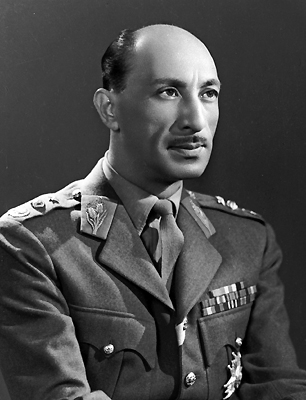
Mohammad Zahir Shah was the last King of Afghanistan, reigning from 8 November 1933 until he was deposed on 17 July 1973. Ruling for 40 years, Zahir Shah was the longest-serving ruler of Afghanistan since the foundation of the Durrani Empire in the 18th century.

Hamid Karzai is an Afghan statesman who served as the fourth president of Afghanistan from July 2002 to September 2014, including as the first elected president of the Islamic Republic of Afghanistan from December 2004 to September 2014. He previously served as Chairman of the Afghan Interim Administration from December 2001 to July 2002. He is the chief (khān) of the Popalzai Durrani tribe of Pashtuns in Kandahar Province.

Mohammad Qasim Fahim was an Afghan military commander and politician who served as Vice President of Afghanistan from June 2002 until December 2004 and from November 2009 until his death. He was considered a powerful and influential figure during the Karzai Administration.

Ghazi Amanullah Khan was the sovereign of Afghanistan from 1919, first as Emir and after 1926 as King, until his abdication in 1929. After the end of the Third Anglo-Afghan War in August 1919, Afghanistan was able to relinquish its protected state status to proclaim independence and pursue an independent foreign policy free from the influence of the United Kingdom.
Presidential elections were held in Afghanistan on October 9, 2004. Hamid Karzai won the elections with 55% of the vote and three times more votes than any other candidate. Twelve candidates received less than 1% of the vote. It is estimated that more than three-quarters of Afghanistan's nearly 12 million registered voters cast ballots. The elections were overseen by the Joint Electoral Management Body, chaired by Zakim Shah and vice-chaired by Ray Kennedy, an American working for the United Nations.
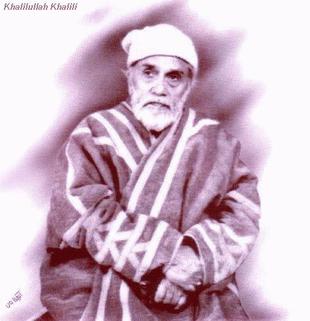
Khalilullah Khalili was Afghanistan's foremost 20th century poet as well as a noted historian, university professor, diplomat and royal confidant. He was the last of the great classical Persian poets and among the first to introduce modern Persian poetry and Nimai style to Afghanistan. He had also expertise in Khorasani style and was a follower of Farrukhi Sistani. Almost alone among Afghanistan's poets, he enjoyed a following in Iran where his selected poems have been published. His works have been praised by renowned Iranian literary figures and intellectuals. Many see him as the greatest contemporary poet of the Persian language in Afghanistan. He is also known for his major work "Hero of Khorasan", a controversial biography of Habībullāh Kalakānī, Emir of Afghanistan in 1929.

Relations between Afghanistan and the United States began in 1921 under the leaderships of King Amanullah Khan and President Warren G. Harding, respectively. The first contact between the two nations occurred further back in the 1830s when the first recorded person from the United States explored Afghanistan. The United States government foreign aid program provided about $500 million in aid for economic development; the aid ended before the 1978 Saur Revolution. The Soviet invasion of Afghanistan in 1979 was a turning point in the Cold War, when the United States started to financially support the Afghan resistance. The country, under both the Carter and Reagan administrations committed $3 billion in financial and diplomatic support and along with Pakistan also rendering critical support to the anti-Soviet Mujahideen forces. Beginning in 1980, the United States began admitting thousands of Afghan refugees for resettlement, and provided money and weapons to the Mujahideen through Pakistan's Inter-Services Intelligence (ISI). The USSR withdrew its troops in 1989.
Habibullah also spelled Habib Ullah, Habibollah, Habeeb-Allah, is a male Muslim given name meaning in Beloved of God, stemming from the male form of the name Habib. It may refer to:

The Emirate of Afghanistan, known as the Emirate of Kabul until 1855, was an emirate in Central Asia and South Asia that encompassed present-day Afghanistan and parts of present-day Pakistan. The emirate emerged from the Durrani Empire, when Dost Mohammad Khan, the founder of the Barakzai dynasty in Kabul, prevailed.
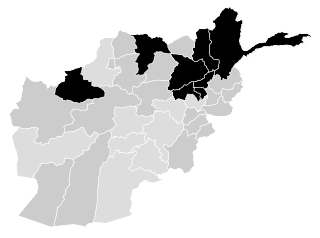
Presidential elections were held in Afghanistan on 20 August 2009. The election resulted in victory for incumbent president Hamid Karzai, who received 49.7% of the vote, while his main rival Abdullah Abdullah finished second with 30.6% of the vote.
Abdul Ahad Karzai was an Afghan politician, who served as the Deputy Speaker of the National Assembly of Afghanistan under King Zahir Shah in the 1960s. He was the son of Khair Mohammad Khan and brother of Habibullah and Azizullah Karzai. His sons are the former Afghan President Hamid Karzai and Ahmed Wali, Mahmud and Qayum. He is also the uncle of Hekmat Karzai.
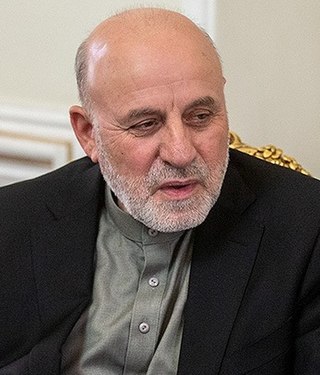
Mohammad Umer Daudzai is a politician in Afghanistan, who most recently served as President Ashraf Ghani's Special Envoy for Regional Consensus Building on Peace and as Head of the High Peace Council (HPC) Secretariat for a few months. He was later appointed President Ghani's Campaign Manager for the 2019 Presidential elections. After a career with international non-governmental organizations including the United Nations Development Program in Geneva, Daudzai started work as two term Chief of Staff of Afghan President Hamid Karzai from 2003 to 2005 and then from 2007 to around 2010. From 2005 until 2007, President Karzai appointed him as Afghan Ambassador in Iran. He then served as the Afghan Ambassador to Pakistan, tasked with advancing efforts to reach a political solution to the war in Afghanistan. In September 2013, Daudzai was asked to serve as Afghan Minister of Interior in Kabul and ensure security for the challenging 2014 presidential elections.

Abdullah Abdullah is an Afghan politician who led the High Council for National Reconciliation (HCNR) from May 2020 until August 2021, when the Afghan government was overthrown by the Taliban. The council had been established to facilitate peace talks between the Islamic Republic of Afghanistan and the Taliban insurgents. Abdullah served as the Chief Executive of Afghanistan from September 2014 to March 2020, and as Minister of Foreign Affairs from December 2001 to April 2005. Prior to that, he was a senior member of the Northern Alliance, working as an adviser to Ahmad Shah Massoud. He worked as an ophthalmologist and medical doctor in the 1980s.

The Karzai administration was the government of Afghanistan under President Hamid Karzai, who became the head of state of Afghanistan in December 2001 after the Taliban government was overthrown. Karzai was appointed at the 2002 Loya Jirga as the Interim President of the Afghan Transitional Administration. After the 2004 Afghan presidential election, he became the President of Afghanistan.
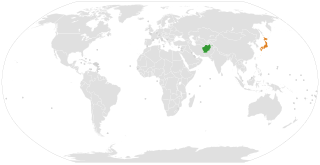
Diplomatic relations between the Islamic Republic of Afghanistan and Japan were officially established in 1931, although early contacts date back to 1907 when the Afghan general Ayub Khan, who defeated the British in the 1880 Battle of Maiwand, visited Japan.

Mohammad Nadir Shah was King of Afghanistan from 15 October 1929 until his assassination in November 1933. He became the king after his victory in the Afghan Civil War of 1928–29. Previously, he served as Minister of War, Afghan Ambassador to France, and as a general in the Royal Afghan Army. He and his son Mohammad Zahir Shah, who succeeded him, are part of the Musahiban.
Habibullah Fawzi is a citizen of Afghanistan, who was a senior diplomat during the Taliban's administration of Afghanistan, and was appointed to the Afghanistan High Peace Council in September 2010. Fawzi had served as the Charge D'Affairs at the Taliban's embassy in Saudi Arabia.

Bilateral relations of Afghanistan and the United Kingdom of Great Britain and Northern Ireland span a long and eventful history, dating back to the United Kingdom's Company rule in India, the British-Russian rivalry in Central Asia, and the border between modern Afghanistan and British India. There has been an Afghan embassy in London since 1922 though there was no accredited Afghan ambassador from 1981 to 2001.
References
- ↑ The New York Times : "Ex-Afghan Envoy Relays..." (October 20, 1983) Link
- ↑ The New York Times : "The Afghan Rulers: Fier..." (December 21, 1981) Link
